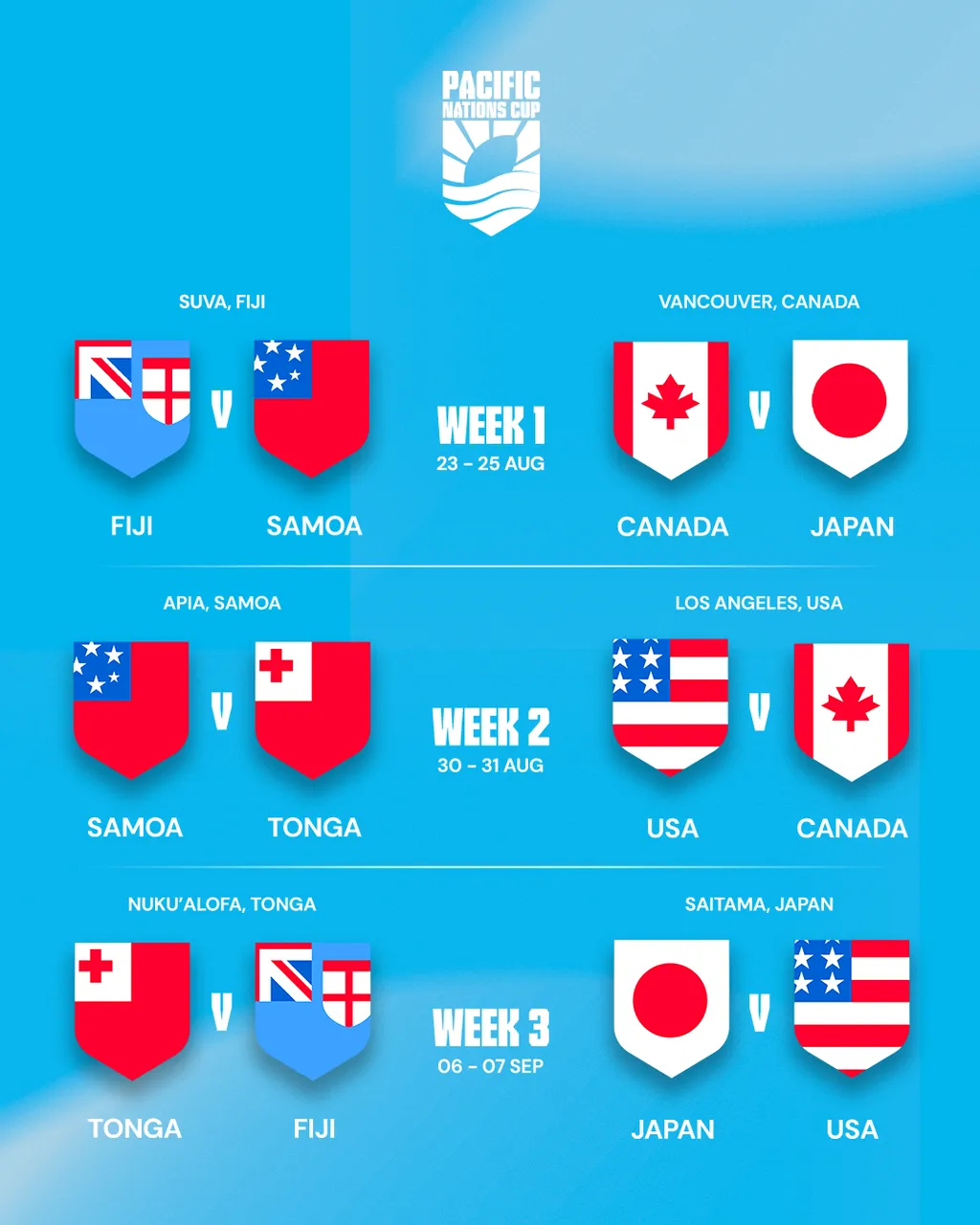- パシフィックネーションズカップは、8月に開幕する2024年大会に向けて、新たな活気に満ちたアイデンティティを発表
- 各チームは最低3試合のテストマッチとのホームでの1試合を保証され、育成、露出、競争力を高める
- プール段階では選手の移動を最小限にするため、3チーム1組で構成する地域プールを2つ設置
- 9月14日から21日まで、東京と大阪で初のパシフィックネーションズカップ決勝シリーズを開催し、毎年日本とアメリカが交代で開催
- 拡大したパシフィックネーションズカップは、新しい国際ラグビーカレンダーに組み込まれ、2026年に発足する新しい大会に反映
ラグビーファンの皆さまは、南半球のインターナショナルウィーク(8月23日〜9月21日)の5週末にパシフィック・ネーションズカップが開催され、毎年恒例となるこのエキサイティングな男子国際大会の日程をマークすることができます。
ワールドラグビーが6つの協会(カナダ、フィジー、日本、サモア、トンガ、アメリカ)と協力して運営するこの大会は、2027年にオーストラリアで開催される男子ラグビーワールドカップの拡大開催に先立ち、競争力を高めることを目的とした新しい年間カレンダーの要として、世界のラグビーをレベルアップさせるためのものです。
年に一度開催される大会として、男子シックスネーションズやラグビーチャンピオンシップと肩を並べる大会となるこの大会は、2026年に開始する2部制の世界カレンダー大会に組み合わされ、かつてないほど確実な試合と機会を提供し、参加6カ国の競争力、ファンとの関わり、商業的な機会を高めます。
6チーム、5週末、2プール、1勝者
ワールドラグビーの「環境サステイナビリティ計画2030」に沿って、選手の疲労回復を最適化し、長距離移動の疲労を軽減し、大会の二酸化炭素排出量を削減するために、3チームからなる2つの地域プールを設けました。各チームは最低3試合を行い、最低1試合をホームで行うことが保証されており、参加協会にとっては、自国での試合チケットを販売し、観客を増やす機会ができました。
フィジー、サモア、トンガの3チームがプールAを構成し、ホームまたはアウェーで対戦します。これにより、太平洋諸島で開催されるテストマッチの数が大幅に増え、トンガは、トンガで今後4年間に開催するパシフィックネーションズカップのホームゲームの数が、これまでの10年間で開催した大会の合計数を超えることになります。太平洋の向こう側では、カナダ、日本、アメリカがプールBを構成し、総当たり戦で上位2位を争います。
決勝ラウンドは日本とアメリカで交互に開催
パシフィックネーションズカップは、「勝者総どり」の決勝シリーズを、戦略上重要な国である日本とアメリカが年交替で開催し、クライマックスを迎えます。第1回大会は日本で開催され、9月14〜15日には、全6チームが東京に移動し、5位決定戦、プール優勝チームとプール準優勝チームによる準決勝が行われます。
3位決定戦と決勝戦は、1週間後の9月21日に大阪で開催され、世界中のラグビーファンにとってエキサイティングなパシフィックネーションズカップ2024の王者が決定します。
ワールドラグビーのハイパフォーマンス・パスウェイおよび選手育成マネージャーのサイモン・ライワルイは次のように述べています。 「今年、活気に満ちたブランドと最適な試合スケジュールのもと、刷新したパシフィックネーションズカップを立ち上げることができ、大変誇りに思うと同時に、興奮しています。この大会に参加する6チームは、長期にわたり、確実に試合が組まれることになり、準備を最適化し、ファンや商業パートナーとのエンゲージメントを進めることができます。」
「太平洋諸島、日本、そして北米の2チームには多くの有能選手がおり、ファンの皆さまは、接戦の数々や、日本での壮絶な決勝戦など、素晴らしいスペクタクルを期待していただけます。」
ワールドラグビーの最高責任者、アラン・ギルピンは次のように述べています。 「ワールドラグビーの使命は、ラグビーを、すべての人のためのグローバルスポーツにすることです。新しく生まれ変わるパシフィックネーションズカップは、私たちの使命を実践する一例です。提案されている、2026年からの2部制の新たな世界大会のモデルや、ハイパフォーマンスユニオンとのクロスオーバー・フィクスチャーと組み合わせることで、パフォーマンス・ユニオンは2026年から前例のない数の年間試合を戦うことになります。
「また、2年に1度アメリカで開催されるグランドファイナルは、ラグビーワールドカップ2031年、2033年に向けて、ラグビーの認知度やアクセス性、関連性を高めるという戦略の中核をなすものでもあります。つまり、この大会は、いくつかの重要な目的を果たす大会なのです。」
日本男子代表のエディー・ジョーンズヘッドコーチは次のように加えました。「パシフィックネーションズカップは、強豪国との定期的なテストマッチを大会という条件下で行えるので、日本代表にとって本当に重要な大会となります。」
「パシフィック・ネーションズカップは、ラグビーチャンピオンシップやシックスネーションズと並び、太平洋地域の国々に定期的な競技の場を提供していきます。また、決勝戦があることも、選手たちにとって結果を伴う競技を経験することができ、また、1年目を日本が開催するということは、日本がいかに素晴らしいラグビー王国であるかということを証明する素晴らしい機会になります。」
USAラグビーCEOのロス・ヤングは次のように語りました。「USAラグビーにとって、今日は、長年の努力と協力が正式なイベント日程としてまとまった非常にエキサイティングな日となりました。ロサンゼルスのホームでパシフィックネーションズカップのキャンペーンを開始することは、2025年にこの地で開催されるファイナルシリーズの土台を築く最高の経験になるでしょう。年間大会における新たな時代の幕開けにラグビーコミュニティーが参加し、アメリカのファンやパートナーに素晴らしい機会を与えてくれたことをうれしく思います。」
トンガラグビー協会のアイセア・アホレイCEO代理は次のように述べました。「 トンガラグビー協会は、トンガラグビーと『イカレタヒ』チームにとって重要な意味を持つこのパシフィックネーションズカップの刷新に興奮しています。どのチームも自分たちは世界ラグビーのトップチームに属している、ということを証明すべく、競争は熾烈になるでしょう。トンガは笑顔で、そして胸を張ってこの挑戦を受けることでしょう。エキサイティングな大会になるはずです。」
パシフィックネーションズカップ2024は、各国の提携放送局、またはラグビーパスTVを通じて、地球上のどこからでも観戦することができます。キックオフ時間、会場、放送については追って発表します。
パシフィック・ネーションズカップをフォローする






